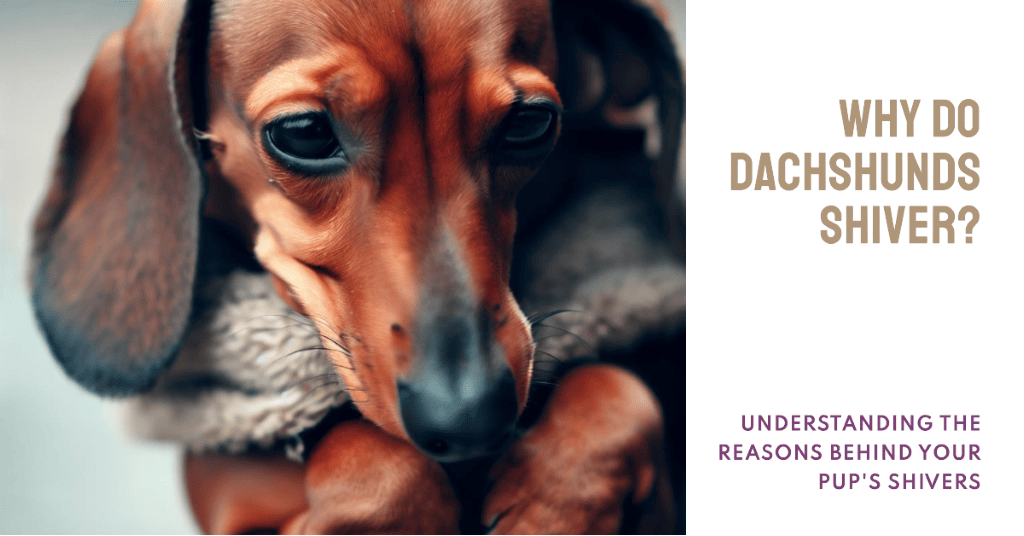Dachshunds are known for their adorable, long bodies and short legs, but they are also known for their tendency to shake or shiver. While it’s normal for dogs to shake occasionally, excessive shivering can be a sign of an underlying health issue or behavioral problem. In this article, we’ll explore the common reasons why dachshunds shiver and what you can do to help your furry friend.
Understanding dachshunds is key to understanding why they shiver. These dogs were originally bred to hunt badgers and other burrowing animals, which required them to have a strong prey drive and a fearless attitude. However, this also means that dachshunds can be prone to anxiety and stress, which can lead to shivering. Additionally, dachshunds have a unique body shape that can make them more susceptible to back problems, which can also cause shivering.
Key Takeaways
- Dachshunds are prone to anxiety and stress due to their hunting instincts and unique body shape, which can lead to shivering.
- Common causes of shivering in dachshunds include anxiety, stress, cold weather, illness, and pain.
- To help a shivering dachshund, it’s important to identify the underlying cause and address it accordingly. This may involve a trip to the vet, behavioral training, or simply providing a warm and comfortable environment.
Understanding Dachshunds
Dachshunds are a small breed of dogs that are known for their long, sausage-like bodies and short legs. They were originally bred in Germany to hunt badgers, but today, they are popular pets around the world.
Dachshunds have a unique body shape that can make them prone to certain health problems, such as back issues and obesity. As a result, it’s important to provide them with proper nutrition and exercise to keep them healthy.
When it comes to body language, dachshunds can be quite expressive. They may wag their tails, bark, or even growl to communicate their emotions. It’s important to pay attention to their body language to understand how they are feeling.
One common behavior that dachshunds exhibit is shivering or trembling. While this can be normal in some cases, it can also be a sign of an underlying medical issue or a response to a specific stimulus. It’s important to observe your dachshund’s behavior and seek veterinary care if you notice any concerning symptoms.
Common Causes of Shivering in Dachshunds
Dachshunds are a small breed of dog that is known for their long, sausage-like bodies. They are also known for their tendency to shiver or tremble. While it may be cute to see your furry friend shivering, it can also be a cause for concern. In this section, we will discuss the most common causes of shivering in Dachshunds.
Cold Weather and Dachshunds
Dachshunds are more susceptible to feeling cold due to their low body fat and short fur. When the temperature drops, they may shiver as a way to try to warm up. To prevent shivering due to cold weather, it is important to keep your Dachshund warm with a sweater or blanket when going outside in colder temperatures.
Shivering Due to Fear or Stress
Dachshunds can be prone to anxiety and fear, which can cause them to shiver or tremble. This can be due to new people or situations, loud noises, or separation anxiety. It is important to help your Dachshund feel safe and secure by providing a calm and stable environment. You can also try using calming techniques such as pheromone sprays or music designed to soothe dogs.
Health-Related Causes of Shivering
Shivering can also be a symptom of an underlying health issue in Dachshunds. Some potential health-related causes of shivering include:
- Pain or discomfort: Dachshunds may shiver if they are experiencing pain or discomfort from an injury or health condition.
- Parasites or poisoning: Parasites or poisoning can cause shivering, as well as vomiting, diarrhea, and other symptoms.
- Neurological disorders: Epilepsy, kidney disease, and other neurological disorders can cause shivering in Dachshunds.
- Canine distemper: This is a serious virus that can cause shivering, among other symptoms.
- Hypoglycemia: Low blood sugar can cause shivering and other symptoms.
- Infections: Infections, such as ear infections or allergies, can cause shivering.
If your Dachshund is shivering frequently or if you notice any other symptoms, it is important to take them to the vet for a check-up. Your vet can help determine the underlying cause of the shivering and recommend appropriate treatment.
Dachshunds and Generalized Tremor Syndrome
Recognizing Generalized Tremor Syndrome
Generalized Tremor Syndrome (GTS) is a neurological disorder that can affect Dachshunds. It is also known as idiopathic head bobbing or bobblehead syndrome. GTS is characterized by involuntary shaking or trembling of the head and body. The shaking can occur when the dog is at rest or in motion, and it can last for a few seconds to several minutes. The exact cause of GTS is unknown, but it is believed to be a hereditary condition.
If you notice your Dachshund shaking or trembling frequently, it is important to take them to the vet for a proper diagnosis. The vet will perform a physical exam and may need to conduct additional tests to rule out other medical conditions. If GTS is diagnosed, the vet will work with you to determine the best course of treatment.
Treatment for Generalized Tremor Syndrome
Unfortunately, there is no cure for GTS, but there are treatments that can help manage the symptoms. The most common treatment is medication, such as benzodiazepines or anticonvulsants. These medications can help reduce the frequency and severity of the shaking.
In addition to medication, there are other things you can do to help manage GTS in your Dachshund. Providing a calm and stress-free environment can help reduce the frequency of the shaking. Regular exercise and a healthy diet can also help improve your dog’s overall health and reduce the severity of the symptoms.
It is important to work closely with your vet to determine the best treatment plan for your Dachshund. With proper management, most dogs with GTS can lead happy and healthy lives.
Behavioral Reasons for Shivering

Dachshunds may shiver due to various behavioral reasons. Here are some of the most common ones:
Attention
Dachshunds are known for their affectionate and attention-seeking nature. They may shiver or tremble to get their owner’s attention. If your dachshund is shivering and you give them attention, they may learn to associate shivering with getting attention. This can lead to a habit of shivering for attention, even when they don’t need it.
Separation Anxiety
Dachshunds are prone to separation anxiety, which is a condition where they feel anxious or stressed when separated from their owners. Shivering is a common symptom of separation anxiety in dachshunds. If your dachshund shivers excessively when you leave the house or when you’re not around, it may be a sign of separation anxiety.
Adrenaline Rush
Dachshunds are energetic dogs that love to play and run around. When they get excited or stimulated, their bodies release adrenaline, which can cause shivering or trembling. This is a normal reaction and usually nothing to worry about. However, if your dachshund shivers excessively during playtime or after exercise, it may be a sign of over-excitement or exhaustion.
Other Behavioral Reasons
Other behavioral reasons for shivering in dachshunds include fear, anxiety, stress, and nervousness. If your dachshund is exposed to a new environment or situation, they may feel overwhelmed and shiver as a result. Similarly, loud noises like thunderstorms or fireworks can also trigger shivering in dachshunds.
It is important to note that while behavioral reasons for shivering are common, they should not be the only ones considered. It is always important to rule out any underlying medical conditions that may be causing your dachshund to shiver. If you notice excessive or abnormal shivering in your dachshund, it is best to consult with a veterinarian to determine the underlying cause.
How to Help a Shivering Dachshund
If you notice your dachshund shivering, there are several things you can do to help them feel more comfortable. Here are some tips:
Check Your Dachshund’s Body Language
First, observe your dachshund’s body language. Are they shivering because they’re cold or because they’re anxious? If they’re cold, you can provide them with extra warmth, but if they’re anxious, you may need to address the underlying issue.
Provide Extra Heat
If your dachshund is cold, provide them with extra heat. You can do this by giving them a sweater or jacket to wear, or by keeping them in a warm room. You can also use a heating pad or hot water bottle to provide extra warmth.
Take Your Dachshund to the Vet
If your dachshund’s shivering is accompanied by other symptoms, such as vomiting or diarrhea, it may be a sign of a more serious medical issue. In this case, it’s important to take your dachshund to the vet for veterinary treatment.
Address Underlying Health Issues
If your dachshund’s shivering is caused by an underlying health issue, such as muscular atrophy or kidney disease, it’s important to address the issue directly. Your vet can provide you with a treatment plan to help manage your dachshund’s symptoms.
Keep Your Dachshund Comfortable
Finally, make sure your dachshund is comfortable. Provide them with a warm, cozy place to rest, and make sure they have access to food and water. If your dachshund is anxious, consider providing them with a calming supplement or speaking with a veterinarian about other ways to manage their anxiety.
By following these tips, you can help your shivering dachshund feel more comfortable and secure.
Conclusion
In conclusion, it is normal for Dachshunds to shiver and shake, especially when they are cold, excited, or anxious. However, excessive shivering or trembling can be a sign of an underlying medical condition, such as distemper, excessive pain, or generalised tremor syndrome. Therefore, it is important to monitor your Dachshund’s shaking behavior and seek veterinary attention if you notice any unusual or persistent shaking.
Age can also be a factor in Dachshund’s shivering behavior. As they grow older, they may experience age-related health issues that can lead to shaking or trembling. If you have an older Dachshund, it is important to keep an eye on their behavior and seek veterinary attention if you notice any changes.
Anxiety can also be a common cause of shaking in Dachshunds. They can be sensitive to loud noises, such as thunderstorms and fireworks, and may shake or tremble as a result. It is important to provide a safe and comforting environment for your Dachshund during times of stress and anxiety.
Finally, medication can also be a cause of shaking in Dachshunds. Certain medications can cause side effects, including shaking and tremors. If your Dachshund is on medication and experiencing shaking or trembling, it is important to consult with your veterinarian to determine if the medication is the cause and if any adjustments need to be made.
Overall, while it is normal for Dachshunds to shiver and shake, excessive or unusual shaking can be a sign of an underlying medical condition. It is important to monitor your Dachshund’s behavior and seek veterinary attention if you notice any changes or concerns.












